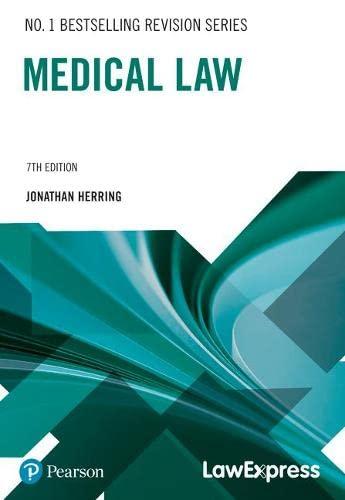Question
Lyndsey Casey is a board member of Electronic Frontiers Australia, who was recently refused documents by the Department of Employment and Workplace Relations. 1 She
Lyndsey Casey is a board member of Electronic Frontiers Australia, who was recently refused documents by the Department of Employment and Workplace Relations. 1 She sought documents relating to recent controversies regarding the level of punitive action by employment services providers against jobseekers. She is concerned that the suspending of payments and allocation of demerit points has become normalised and participants in the new Workforce Australia model are being abused. The automatic nature of penalties where there is no human oversight is particularly controversial. Employment service providers are given a wide ranging power to determine if a person had 'an acceptable reason' for missing an appointment or failing to lodge job applications. The system and current high levels of penalties are explained here: Mutual obligation Snapshot - the Targeted Compliance Framework - ACOSS Workforce Australia Snapshot - Payment suspensions - ACOSS Participants in the system are told to complain to a customer service line and there has arguably been little improvement in service quality. In Ms Casey's view is the quality of these processes is questionable and there is an important public debate to had about how best to cater to the needs of vulnerable or at-risk people. She therefore requested: "Internal department assessments from the last three months relating to the level of suspensions, and patterns in compliance decision making by employment services providers." The Department identified one document that fell within the scope of the request, it was titled: Multi Agency Executive Briefing: Recent coverage of the Targeted Compliance Framework - A risk analysis of compliance trends for sensitive cohorts The Department argued that releasing its assessment would impede its operations (section 47E(d), and was not in the public interest. Their decision cited in particular that it would inappropriate and harmful to disclose - Disclose how their oversight functions, and ability to monitor trends in decision-making by providers. It would also disrupt the degree to which providers may be willing to be open with the department in discussing errors, patterns and solutions. The statistical analysis was drawn using a sensitive piece of a machine learning technology, which used complaints data, service provider statistics and audit outcomes, to predict the likely future level of inaccurate decision- making amongst 'sensitive cohorts'. - Disclose any analysis of what it regards as a 'sensitive client' or the criteria by which a decision might be viewed as inappropriate. This could lead to efforts to game the system by those seeking to avoid the system of in person appointments and employment service provider penalties. Ms Casey provides you with the following resources which 'may assist' in your public interest analysis and see the documents released.
1 Responsibility for job seeker compliance sits , you may assume the three consulted on the request, and share viewpoints expressed in the eventual decision.
Key Labor MP urges new independent watchdog for job services providers | Australian politics | The Guardian Scrap 'punitive' mutual obligation system for Australia's jobseekers, job agency tells inquiry | Unemployment | The Guardian There is an ongoing senate inquiry into the conduct of employment service providers, which is based on these webpages: Inquiry into Workforce Australia Employment Services - Parliament of Australia (aph.gov.au) A recent piece of the Saturday Paper reported that: Under the current $6.3 billion Workforce Australia system, the network of non-government and for- profit job service providers are given the power to automatically suspend or cancel welfare payments where a jobseeker has not turned up for a mandatory appointment or failed to meet other requirements of "mutual obligations", such as applying for a certain number of jobs a month. Jobseekers are given two days to "re-engage" or correct any errors that may have led to the payment suspension in the first place. In just three months to the end of June, 239,805 payment recipients had their benefits suspended a total of 436,635 times. That's almost half - 45 per cent - of all jobseekers in the Workforce Australia system. More than 25 per cent of these suspensions were for Aboriginal and Torres Strait Islander people, who make up about one seventh of the entire system caseload. 2
Please highlight what possible arguments could be raised for the disclosure of the documents in regard to the freedom of information act 1982 and the OAIC guidelines.
Step by Step Solution
There are 3 Steps involved in it
Step: 1

Get Instant Access to Expert-Tailored Solutions
See step-by-step solutions with expert insights and AI powered tools for academic success
Step: 2

Step: 3

Ace Your Homework with AI
Get the answers you need in no time with our AI-driven, step-by-step assistance
Get Started


